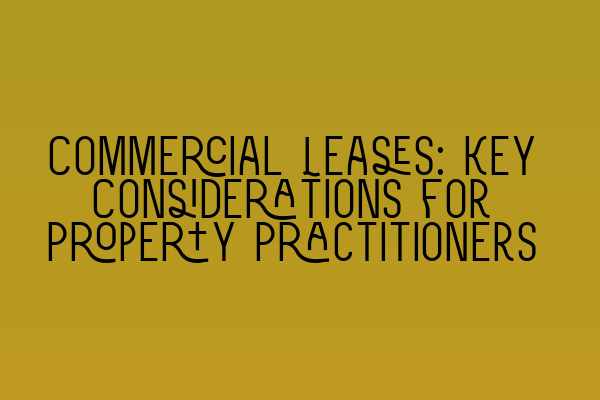Commercial Leases: Key Considerations for Property Practitioners
As a property practitioner, it is vital to have a comprehensive understanding of commercial leases. Commercial leases are contracts between a landlord and a tenant for the occupation of a commercial property. They often involve complex legal arrangements and require careful consideration to protect the interests of both parties involved.
In this article, we will discuss some key considerations for property practitioners when dealing with commercial leases. Whether you are a solicitor, property professional, or preparing for the SQE exams, understanding these key points will strengthen your knowledge base and help you navigate through the intricacies of commercial lease transactions.
1. Lease Negotiations
One of the most important aspects of commercial leases is the negotiation process. This is where you will work closely with your client to determine the terms and conditions of the lease. It is crucial to consider factors such as rent, lease duration, break clauses, repair obligations, and any additional provisions unique to the specific property. Effective negotiation skills are essential to ensure your client’s requirements are met while balancing the needs of the landlord.
For more information on negotiation techniques, check out this article: SQE 1 Practice Mocks FLK1 FLK2
2. Rent and Financial Considerations
The financial aspects of a commercial lease are a critical consideration for both landlords and tenants. As a property practitioner, you will play a significant role in advising clients on the appropriate rent for the property and negotiating favorable terms. You will need to consider factors such as market rates, rent reviews, service charges, and any potential rent-free periods. It is essential to ensure that the financial terms are fair and sustainable for both parties involved.
To test your knowledge of rent-related concepts, take a look at this practice exam: SQE 1 Practice Exam Questions
3. Tenant Covenants
Tenant covenants are obligations that the tenant must adhere to throughout the lease term. These may include obligations related to repairs, maintenance, insurance, subletting, alterations, and compliance with statutory requirements. As a property practitioner, it is crucial to ensure that the tenant covenants are clear, reasonable, and enforceable. You will need to advise your client on their rights and responsibilities and help them avoid any potential breaches of covenant.
4. Landlord’s Obligations
While tenant covenants focus on the tenant’s obligations, it is equally important to consider the landlord’s obligations under the lease. These may include obligations to maintain the structure of the property, provide services, and comply with statutory requirements. As a property practitioner, you should carefully review the landlord’s obligations to ensure they are reasonable and in line with legal standards. Failure to do so may result in disputes or legal challenges down the line.
For more information on landlord-tenant relationships, check out this informative article: SQE 2 Preparation Courses
5. Assignment and Subletting
Assignment and subletting rights are essential considerations in commercial leases. Tenants may wish to assign their lease to another party or sublet all or part of the premises to third parties. As a property practitioner, you will need to advise your client on their rights and obligations regarding assignment and subletting, as well as any required consents from the landlord. Understanding the legal implications and potential restrictions related to assignment and subletting is crucial for a successful lease transaction.
6. Dispute Resolution
Lastly, it is important to consider dispute resolution mechanisms when dealing with commercial leases. Disputes can arise from various issues, such as rent arrears, breach of covenant, or disagreements regarding repairs or alterations. As a property practitioner, you should familiarize yourself with the different dispute resolution options available, including negotiation, mediation, arbitration, or litigation. A comprehensive understanding of dispute resolution procedures will enable you to advise your client on the best course of action in case of a dispute.
To stay updated on the latest SQE exam dates and other important information, visit: SRA SQE Exam Dates
Conclusion
Commercial leases require careful consideration of various legal, financial, and practical aspects. As a property practitioner, it is crucial to have a comprehensive understanding of the key considerations discussed in this article. By mastering lease negotiations, financial considerations, tenant covenants, landlord’s obligations, assignment and subletting, and dispute resolution mechanisms, you will be well-equipped to navigate the complex world of commercial leases and provide excellent service to your clients.
